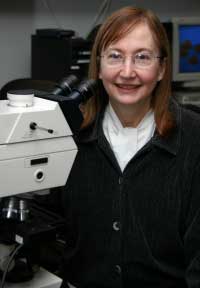hansonlab.org/research/cfs_...
Patients with ME/CFS experience a profound lack of energy, severe fatigue, along with a variety of other symptoms, including one or more of the following: muscle pain, headaches, gastrointestinal discomfort, difficulty concentrating, exacerbation of symptoms following exercise, abnormal regulation of blood pressure and heart rate, and unrefreshing sleep. Mitochondria, sub-cellular organelles are responsible for producing ATP, the energy coinage of the cell, through conversion of glucose. Therefore, a logical approach to learn more about a disease affecting energy is probing of the function of mitochondria.
Mitochondria are made up of molecules encoded by the nuclear genome--DNA located in the nucleus--as well as the mitochondrial genome—a small amount of DNA present within each organelle. Defects in mitochondrial DNA lead to devastating genetic diseases, with such symptoms as brain abnormalities, severe fatigue, blindness or defective heart function—and can be fatal. The mitochondrial genome of healthy humans also exhibits some natural variation—a single component of the mitochondrial DNA sometimes differs between one human and another—this is known as a SNP (single nucleotide polymorphism, "snip"). Often more than one SNP differs between one population of humans and another—for example, mitochondrial genomes whose origin can be traced to France differ in a number of SNPs from those in people in Central Asia. These different types of mitochondrial genomes, based on a specific set of SNPs, are referred to as haplogroups. Even people whose mitochondrial DNA belongs to the same haplogroup can differ among one another because of some variation in additional SNPs. Some mitochondrial SNPs have been associated with various characteristics, such as adaptation to cold weather or high altitude environments and have been implicated in susceptibility to diabetes and various inflammatory diseases. An informative review of the role of mitochondria in disease has been written by Wallace and Chalkia, researchers at the University of Pennsylvania.
A further complexity of mitochondrial genetics is that there are many individual mitochondria within the same cell, and thus many copies of mitochondrial DNA in each cell. Sometimes new mutations arise so that some of the copies of DNA within the same cell, and therefore within the same person, differ from one another. This situation is called “heteroplasmy”. As cells grow and multiply, by chance there can be uneven distribution of normal vs. abnormal DNA to different cells. If mitochondrial DNA with a harmful mutation becomes the predominant type in a particular tissue, serious symptoms will emerge.
full text translational-medicine.com/...
